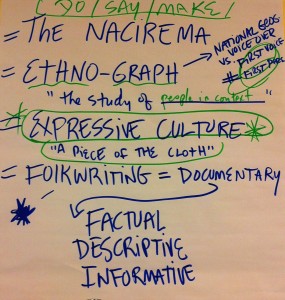 I completed my first field school! It’s part of my journey to rediscover my ancestry and my connections to Italian sericulture (silk throwing) traditions. The field school was an academic and creative writing experience — a process challenging me and allowing me to focus on self, place, heritage and the cultural arts relevant to my history.
I completed my first field school! It’s part of my journey to rediscover my ancestry and my connections to Italian sericulture (silk throwing) traditions. The field school was an academic and creative writing experience — a process challenging me and allowing me to focus on self, place, heritage and the cultural arts relevant to my history.
At Native Seed Search headquarters, in desert lands near the Rillito River, about 27 of us joined folklorists in a journey to celebrate folklore, hone skills and shape stories. My brain is still churning from the learning, but before this weekend is over I want to post a quick note about this amazing intercultural writers’ experience.
It’s a note of thanks to teachers, led by Dr. Maribel Alvarez (and managed within her Tucson Meet Yourself projects). Faculty included folklorist Dr. Jim Griffith, doctoral candidate and founding executive director of Voices Regina Kelly, and Arts Institute instructor/digital storyteller guru Therese Perreault. They fed us generously with their knowledge as well as their experiences in the cultural eco-systems of life.
Expressive culture, says Maribel, are those layers of embellishment and knowledge that reflect the practices of people as they express their community and traditions. When we experience other people in the context of their rituals, tools, clothes, food, music, arts and stories, isn’t it true that we are so enriched? If you have attended a Native American ceremony, eaten a new ethnic food, heard a folk legend, or attended the Tucson Meet Yourself folklife festival, I think you know what I mean.
So for a few days our enthusiastic group dove into study of the multi-cultural, as a backbone for our own individual research. Unique, heart-warming, incredible projects are underway as a result of this class. I look forward to keeping in touch with my partners as they work through their research and produce results.
For now, here are three resource tips for those looking to conduct their own research projects in folklore writing:
- A most detailed reference book on field research, and on establishing our own voice, methodologies and writing of folklore projects is Fieldworking.I bought the book and love it.
- If you’re interested in folklore and don’t own a Jim Griffith book — go get one! I have three. And in the meantime listen to some audio of Jim, discussing traditional arts, Native American stories, traditional foods, traditional arts and more.
- Keep in touch with local folklore. In Tucson, sign-up to receive copies of the BorderLore newsletter, which is now part of Tucson Meet Yourself. I’ll be editing a few editions over the summer and hope you’ll be with me, to share or comment. Viva our own voices, our personal stories.
Note: the flip chart detail is from Dr. Maribel Alvarez’s opening lecture.

 Follow
Follow